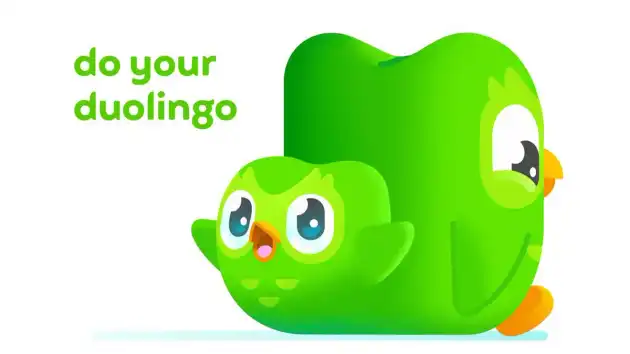I knew Duolingo was a different kind of tech company the day I interviewed there in December 2018. Before COVID, interviews were in person, which meant I had to fly from Seattle to Pittsburgh to interview. That was the first sign that things were different: Pittsburgh?! Duolingo isn’t just outside the West Coast tech bubble, it’s not even the same time zone. At the time I worked for Facebook, whose Menlo Park headquarters was like Disneyland for computer nerds, and if you made the hour-long drive (traffic!) to the Instagram San Francisco offices you’d pass one gleaming tech giant campus after another. Duolingo, in contrast, was tucked away in the third floor of an old furniture showroom in a city known more for steel mills and stone churches.
 Seriously, what kind of company would do this at the Superbowl?
Seriously, what kind of company would do this at the Superbowl?
True, once you got inside the Duolingo office, it looked like a tech company: Open floor plan, foosball tables. The interview was much like a normal tech interview; I spent hours answering technical questions on whiteboards and laptops. While Duolingo employees spent most of the time asking the questions, I was also “interviewing” the company to see if it was the kind of place I wanted to work. I saw two things that day that made me want to give Duolingo a try if they gave me an offer. First, at 12:30, Chef Rick rang a bell, and everyone in the office, including myself and my “lunch buddy,” headed to the cafeteria to have lunch together. The lunch was a full hour. No hurried eating at desks. People who wrapped up early and didn’t want to talk would do things like head to the aforementioned foosball tables, or perhaps go into one of the conference rooms to solve the day’s New York Times crossword together. Second, I happened to be interviewing on the last day before Duolingo’s winter break, when they close the office for two weeks in December to let everyone start the new year refreshed. My impression from these two facts: Duolingo seemed to be the kind of place that fundamentally respected the humanity of the people who worked there. It hadn’t let tech-bro-hustle-culture take over.
While it may not be tech-bro, Duolingo does make money. I remember a company Q&A with Duolingo’s CEO, Luis von Ahn, that happened during a celebration of the company’s first 10 years. Someone asked what Luis if there was anything he wished he’d done differently in Duolingo’s history. His answer: “I wish we’d figured out how to make money sooner.” He went on to explain that it was only after they’d found and proven they had a successful business model could they focus on growing and hiring the artists, designers, curriculum specialists, learning scientists, TikTok stars, and engineers needed to build the zany yet effective product the world now loves.1 If Duolingo had cracked the problem of the business model sooner, then perhaps we’d be even further along making it fun to learn on your phone.
Duolingo’s business model is perhaps the most innovative and important thing about the company. There are plenty of EdTech companies in the world and plenty of language learning companies. There plenty of nonprofits trying to improve the world through better education. Other companies do “gamification” more aggressively than we do. Duolingo’s found a unique winning formula: Develop educational material that people find valuable, give it away to reach the most people and do the most good, but also make it so fun and engaging that people fall in love with the product and happily pay so they can use it more. One thing I’ve come to appreciate in my time working here is just how magical it feels to work somewhere that has figured out a good way to make money.
Another thing working at Duolingo has taught me: I seriously undervalue “fun.” Because I’ve always loved learning, I forget that not everybody has the same intrinsic motivation to study new things. I’m pretty sure that if I had tried to start a company like Duolingo, my product would have been serious, felt serious, would have attracted a few dozen people who take learning as seriously as I do, and would have failed miserably. Learning can be fun and effective, but you need to pay attention to both the “fun” and “effective” parts. I naturally pay attention to “effective,” and I love how being at Duolingo has surrounded me with coworkers who are great at the “fun” part.
I won’t pretend Duolingo is perfect. It’s not easy having an owl for a boss; it’s kind of nasty when the Big Green One throws a pellet. However, I just celebrated my fifth anniversary at Duolingo, and I feel lucky to have found a place to work that lines up so well with my values. Now, go do your Duolingo!
- It’s important to get this right; in 2011-2012, I worked for a small company that had a great product, strong brand, fun team to work with… but it was too hard to make money, and that company no longer exists. RIP, Urbanspoon.↩